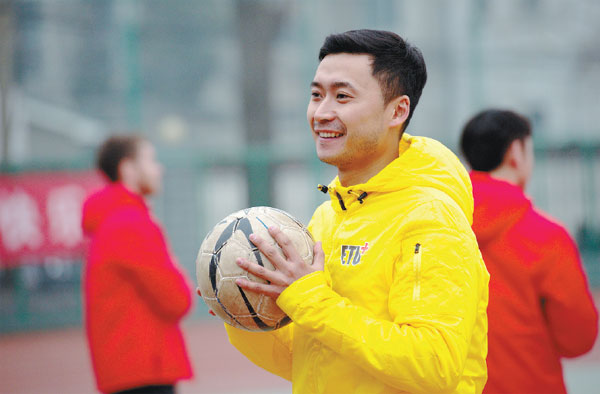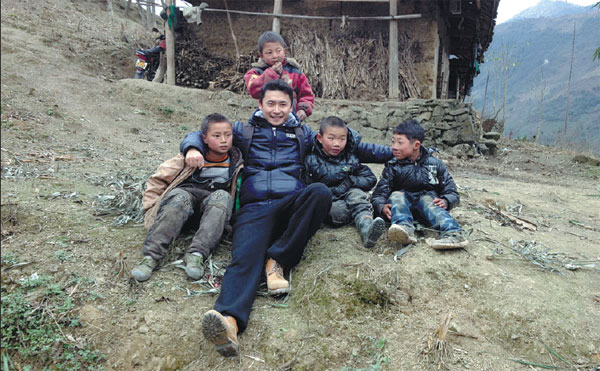A whole new game for generous Gao
Updated: 2014-05-24 07:29
By Luis Liu (China Daily)
|
|||||||||||

Former Guo'an star has found fulfillment through his charitable work with children in remote areas of China's mountainous west
Editor's Note: Soccer is the world's No 1 sport, and China has its own aims for the game. President Xi Jinping has spoken about his soccer dream: China reaching the World Cup, China hosting the Cup and, ultimately, China winning the coveted trophy. However, the nation still lags far behind in the soccer world. The 2014 Brazil World Cup is just around the corner and we have selected 11 key figures from around the country to tell us about their soccer dreams. The interviews will be on RTHK Putonghua Channel at 4 pm on Sundays through June 8.
Chinese soccer players are often associated with some of the more unseemly things in life; including corruption, carousing at night clubs late at night and excessive drinking and smoking.
|
Gao Leilei has discovered a comfort zone for himself a long way away from the game which made him a household name in Beijing. Wei Xiaohao / China Daily |
|
Gao says he has dedicated "all he's got" to his charity work to help the underprivileged in the mountainous west of China. Provided to China Daily |
However, there is a former player determined to change that image.
Gao Leilei, a recently retired player who now owns a restaurant, is doing charity work in Mabian Yi Autonomous County, Sichuan province, helping children who live in the remote mountainous villages.
Gao, 33, was born and raised in Beijing. Before playing overseas, he was one of the brightest stars at Beijing Guo'an. Almost every season his goals featured among the top 10 of the year.
But, his off-field endeavors are far more praiseworthy. He has built two primary schools in Sichuan, one in the name of his late father and the other is named after his infant son.
"Yes, it was my father who passed on to me the (generous) spirit," Gao said. "When he was teaching in the university, he would sometimes sell belongings such as bikes and watches just in order to help his students.
"So by naming the schools, I want to salute my father and pass the spirit on to my son," Gao said.
In his final days, Gao's father told him he wanted to donate money to help the underprivileged.
Gao has since dedicated "all he's got" to his charity work. He did not even have a wedding ceremony as he thought the money could be spent more meaningfully. And he donated all the cash gifts from his son's 100-day celebration to a local welfare center.
Many do not understand such self-lessness, but he has put his heart and soul into it nonetheless. He attributes his generosity to his personality.
"It's just like how I played the game: I always do the best I can," Gao said.
Unlike other celebrities, he values company the most when doing his charity work. "I think charity is a way to give love to other people. In terms of love, money is definitely not the most important thing," Gao said.
He learnt that from his five-month-old son.
"I bought lots of new clothes and toys for him, but at the end of the day I found that what he really cared about was how much time I spent with him," Gao said.
It also applies to the children in the villages.
"They are happiest when you go to them, talk and play with them. " Gao said. "Every time I donate money I personally go to the schools. Maybe for one kid, I can only give 100 yuan on average. But it is way more meaningful than just simply transferring 100 yuan to a bank account."
Gao was shocked to find on his initial excursions in this rapidly developing country that there are still places, like Mabian, where children cannot even be properly fed. Many eat the same food as the cattle.
Everytime he goes to those areas now he makes sure he is armed with cream cakes, which the children find delicious.
Just looking at their smiling faces gives Gao an overwhelming sense of of satisfaction.
However, on one such trip, he noticed a boy reluctant to eat the snacks as he wanted to take them home to his parents. That only steeled Gao's resolve.
"From that time I said to myself, next time I must bring more," he said, "and that I needed to donate more to the schools to help the kids change their lives so one day they would be able to buy whatever they want."
There is a common saying that charity is a job for celebrities, but Gao scoffs at that notion and says everyone should take part in the cause.
"I have chatted with Yao Ming as he has also devoted a lot of his time doing charity work. Even he is nobody in the remote villages," Gao said. "The kids don't care about who you are, they only care about whether you are willing to join them, chat and play with them. Then they feel like they have a relative taking care of them from afar. That is what I want to achieve through my charity work.
"'Charity' may be too big a word, but it is all around us," Gao said. "Every time you help others, even with just a bottle of water, it is charity. You don't need to be rich or famous to do it."
A turbulent career
Gao is by no means wealthy. During his peak, Gao was playing in Europe while the financial crisis destroyed the local economy. He earned a mere 2,000 euros ($2,651) monthly, which was much lower than what he could have made in China. One Chinese Super League team even offered him a million yuan contract, but he rejected it.
"I preferred to stay in a pure environment in which I could really enjoy soccer," Gao said, obviously harboring some unpleasant memories about Chinese soccer.
At the start of this century, he was one of the most talented Chinese players. In the last league game of the 1999 season, he single-handedly killed the championship dream of China's "Kaiserslautern", Liaoning, with a stunning goal. The whole nation applauded him, but he was never fully embraced by his team or the soccer fraternity.
He said he was isolated by the team's "old guys" for his straightforward attitude. They tried to supress him rather than help him grow.
"Maybe it is the deep-rooted Chinese tradition - that seniority must be respected," he said, "but on the pitch one should have the attitude that no matter who you are, I will defeat you. Even if Ronaldo stood in front of me I would try to dribble past him."
During one training session, young Gao passed a long ball to an older player. The kick was too strong and the player yelled at him, telling him to slow down and pay closer attention next time.
"But when that older player did the same thing he shouted: Hey! Why don't you run faster?" Gao said. "That is when I knew that this environment was not for me."
What disappointed him most was being dropped from China's 2002 World Cup squad list. After making the national team's provisional list, the then Beijing Guo'an coaches left him on the bench for the rest of the season, which led to his being dropped from the final squad, according to Bora Milutinovic, the then head coach of Chinese national team, in an interview before the World Cup finals.
If he had made that team, his whole career could have taken a vastly different turn.
H was told by some to "do as the Chinese do": treat the coaches to a meal or have a drink with them and he would definitely be in the starting lineup.
But Gao despised that view.
"I know it's part of the business culture in China, but soccer players should be judged by their competence," Gao said. "We can fool ourselves, but at the end of the day, we will also be a laughing stock in the soccer world."
During his final two years at Beijing Guo'an, he was one of the fans' most beloved players but, at the same time, the coach's (Shen Xiangfu) least favorite. Each time, Guo'an came back from a deficit, Gao was the first name the fans would chant. But the louder the chorus, the less chance he would get to step onto the pitch.
"He (the coach) wanted me to play fully defensively, but the team needed to attack," Gao said. "Playing the coach's style would earn me more game bonuses as the money is distributed by the coach, but I would rather play for the fans."
He still loves soccer; just not the game in China. He seldom watches Chinese soccer games. Instead, he enjoys his life with family and the children in the villages.
Gao admits he felt a lot of self-pity during his career but, "doing charity work is a way I have found to fulfill myself".
Q&A
After your experience in the foreign leagues, what do you think of Chinese soccer?
I feel the Chinese media only focuses on the players who play in the major leagues. When I was in Europe, I noticed in the second or third-class leagues there were many Japanese and Korean players in youth teams and even in the first teams. It's not a coincidence that players like Shinji Kagawa are playing in those major leagues, because Japanese soccer already had a complete system for player training.
I think Chinese soccer has two ways out: training the youth and giving the young players chances to play in Europe, even if in the second or third-class leagues.
Which teams will you focus on in the coming World Cup?
I like to watch Japan and South Korea and see how they play. Many Japanese and Korean players are individually special and they merge into the team well, that's what we should learn from them.
When do you think the Chinese soccer dream will come true?
Some say, optimistically, that we will be in the final eight of the World Cup in 30 years, some say we will never reach the World Cup again.
If we work according to a strict set of rules, it is even possible we could be in the next World Cup. But if we continue to sway back and forth, we will never have the chance. If someday our children do not need to make a choice between soccer and school, there will be hope for us.
luisliu@chinadailyhk.com
(China Daily 05/24/2014 page16)
Today's Top News
EU-wide elections could shake up the bloc
Beijing urges to intensify terror fight
Deadly floods leave Balkans desolate
Spanish TV comedy angers China
Russia outrage over Prince Charles' Putin remarks
Beijing bumps up security patrols
Britain condemns terrorist attack in Xinjiang
Putin sends condolences to Urumqi attack victims
Hot Topics
Lunar probe , China growth forecasts, Emission rules get tougher, China seen through 'colored lens', International board,
Editor's Picks

|

|

|

|

|

|







